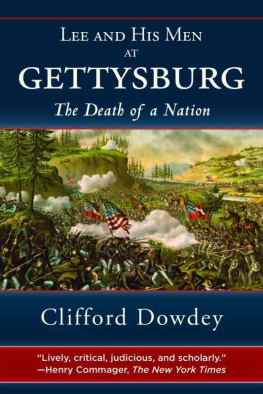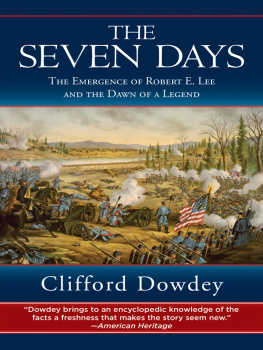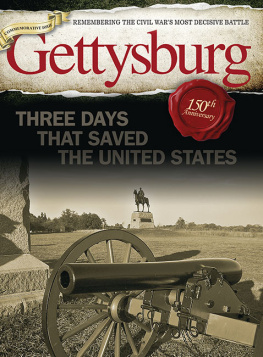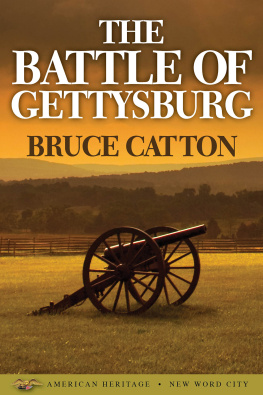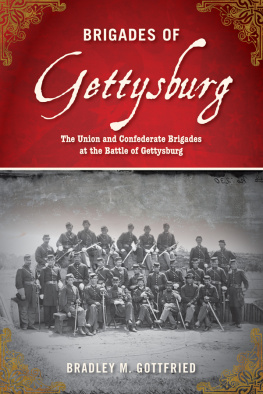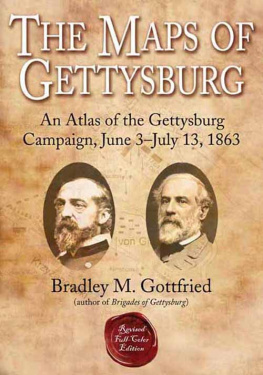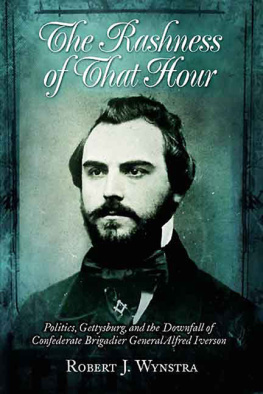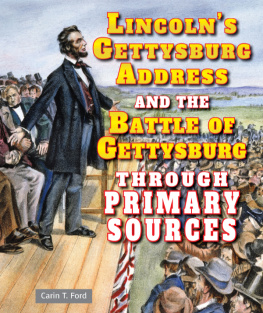
L EE AND H IS M EN
AT
GETTYSBURG
L EE AND H IS M EN
AT
GETTYSBURG
The Death of a Nation
Clifford Dowdey

Skyhorse Publishing
Copyright 1958 by Clifford Dowdey as Death of a Nation
Copyright renewed 1986, 2011 by Carolyn Dunaway
All Rights Reserved. No part of this book may be reproduced in any manner without the express written consent of the publisher, except in the case of brief excerpts in critical reviews or articles. All inquiries should be addressed to Skyhorse Publishing, 307 West 36th Street, 11th Floor, New York, NY 10018.
Skyhorse Publishing books may be purchased in bulk at special discounts for sales promotion, corporate gifts, fund-raising, or educational purposes. Special editions can also be created to specifications. For details, contact the Special Sales Department, Skyhorse Publishing, 307 West 36th Street, 11th Floor, New York, NY 10018 or
Skyhorse and Skyhorse Publishing are registered trademarks of Skyhorse Publishing, Inc., a Delaware corporation.
www.skyhorsepublishing.com
10 9 8 7 6 5 4 3 2 1
Library of Congress Cataloging-in-Publication Data
Dowdey, Clifford, 1904-1979.
[Death of a nation]
Lee and his men at Gettysburg : the death of a nation / Clifford Dowdey.
p. cm.
Originally published: Death of a nation. New York : Knopf, 1958.
Includes bibliographical references and index.
ISBN 978-1-61608-353-3 (alk. paper)
1. Gettysburg, Battle of, Gettysburg, Pa., 1863. 2. Confederate States of America. Army of Northern Virginia. 3. Lee, Robert E. (Robert Edward),
1807-1870. I. Title.
E475.53.D746 2011
973.7349--dc23
2011017813
Printed in the United States of America
Above the bayonets, mixed and crossed,
Men saw a gray, gigantic ghost,
Receding through the battle-cloud,
And heard across the tempest loud
The death-cry of a nation lost!
WILL THOMPSON

contents
MAPS
(by Guy Fleming)
1 The Campaign | 
|
2 The Scene of Battle |
3 The First Day: July 1, 1863 |
4 The Second Day: July 2,1863 |
5 The Third Day: July 3, 1863 |









L EE AND H IS M EN
AT
GETTYSBURG

Rendezvous with Disaster

T HE SUBSTANTIAL market town of Chambersburg, Pennsylvania, seemed unusually quiet, even for a Sunday, after the noisy passage of troops of the Army of Northern Virginia during the week. The houses and stores were shuttered, and the front doors of the Franklin Hotel were locked. Citizens dressed for the Sabbath moved with wary curiosity about the streets.
They were hostile but not apprehensive, as the Confederate soldiers had not committed acts of vandalism or abused the inhabitants. On the contrary, the troops had been highly good-humored in the face of taunts and insults.
Despite the good-humor of the soldiers and the strict discipline maintained by their officers, Lees army had levied heavily on the storekeepers and the citizens of the bountiful Pennsylvania countryside. They had been orderly about it, all very businesslike, giving scrip in their own money for everything they confiscated. These items included boots, suits, shoe leather, horseshoes, bacon, flour, coffee, sugar, sauerkraut, and neats-foot oil. The list was endless.
The enemy troops seemed in need of every necessity for living, and the enlisted men displayed a passion for stealing hats which defied the most rigid supervision. The soldiers would put up with anythingpatches, ill-matching clothes, broken shoes or noneexcept the absence of a hat. Marching through the Northern towns, the men became very adept at snatching hats from the heads of civilians standing on the sidewalk. They would quickly ball the hats up and tuck them under their arms. Even if an officer tried to recover the property of an outraged civilian, he could not well stop several miles of soldiers to search under each arm.
The Chambersburg citizens had also seen hundreds of cattle and horses that, by their silkiness in comparison to the Confederates animals, they recognized as having belonged to their own people.
Yet in Chambersburg all had not been taken. As the requisitioning officers had been courteous, the citizens surrendered only what was visible, and stores still remained in locked cellars. The natives knew from rumors that the last of the enemy troops had passed through the town.
Six divisions of infantry were now camped outside of Chambersburg on farms along the roads to the north and northeast. There the hard-bitten troops were taking their own Sunday easebathing their sore feet in the creek, mending their poor clothes, and eating more heartily than they had in months. They carried very little equipment, far less than the civilians had seen on any of their own soldiers. Some carried only a canteen and knapsack stenciled with the faded letters of V ERMONT , M ASS ., or N.J.relics of old battlefields. Filling their knapsacks from the quartermaster wagons, the lean men looked very unwarlike, and no stranger coming upon their cheerful camps would have suspected them of being an invading army in the enemys country.
Closer to town, their headquarters camp was pitched informally in the roadside grove called Shetters Woods, where picnics and Fourth-of-July celebrations were held in the shade. Canvas-topped wagons marked U.S. were parked without order beside a group of tents. The picketed horses of the staff officers, better mounts and in better condition than those in the cavalry that had come through town, foraged for grass. To and from one of the tents, indistinguishable from the others, officers and couriers came and went all through that warm Sunday of June 28, 1863.
Next page
